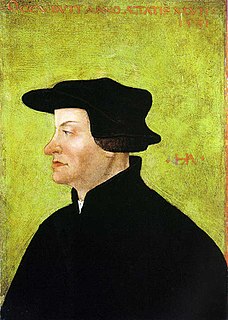A Quote by Saint John Chrysostom
Memory of our good works makes us negligent and leads to arrogance. Do not think of your good deeds, so that God may remember them.
Related Quotes
Behold how all those people are merchants who shun great sins and would like to be good and do good deeds in God's honour, such as fasts, vigils, prayers, and similar good deeds of all kinds. They do all these things so that our Lord may give them something, or so that God may do something dear to them. All these people are merchants.
Like Muslims we assume that God will judge us "on balance." If our good deeds outweigh our bad deeds, we will arrive safely in heaven. But, alas, if our evil deeds outweigh our good ones, we will suffer the wrath of God in hell. We may be "marred" by sin but in no wise devastated by it. We still have the ability to balance our sins with our own righteousness. This is the most monstrous lie of all.
But pain may be a gift to us. Remember, after all, that pain is one of the ways we register in memory the things that vanish, that are taken away. We fix them in our minds forever by yearning, by pain, by crying out. Pain, the pain that seems unbearable at the time, is memory's first imprinting step, the cornerstone of the temple we erect inside us in memory of the dead. Pain is part of memory, and memory is a God-given gift.
Many biblical passages teach that we're not saved by our own efforts but by the grace of God alone. But the same passages also tell us good works are an essential evidence of the salvation experience. We're not saved by good works, but for good works. It begins with God's grace, and it's sustained by his grace as you shape your character by what you do as you cross the bridge.
The Sacrament of the Body of the Lord puts the demons to flight, defends us against the incentives to vice and to concupiscence, cleanses the soul from sin, quiets the anger of God, enlightens the understanding to know God, inflames the will and the affections with the love of God, fills the memory with spiritual sweetness, confirms the entire man in good, frees us from eternal death, multiplies the merits of a good life, leads us to our everlasting home, and re-animates the body to eternal life
I believe that God will help us to forget things, the memory of which would do us harm, or rather that He will enable us to remember only so much of them as will be for our good, and we, ourselves, not emotionally overwhelmed. The pain endured. The lesson learned. Let it now be forgotten! Face the future with courage, cheerfulness, and hope. Give God the chance and He will make you forget all that it would be harmful to remember.
French wines may be said but to pickle meat in the stomach, but this is the wine that digests, and doth not only breed good blood, but it nutrifieth also, being a glutinous substantial liquor; of this wine, if of any other, may be verified that merry induction: That good wine makes good blood, good blood causeth good humors, good humors cause good thoughts, good thoughts bring forth good works, good works carry a man to heaven, ergo, good wine carrieth a man to heaven.
The truth is that there are no good men, or bad men,' he said. 'It is the deeds that have goodness or badness in them. There are good deeds, and bad deeds. Men are just men - it is what they do, or refuse to do, that links them to good and evil. The truth is that an instant of real love, in the heart of anyone - the noblest man alive or the most wicked - has the whole purpose and process and meaning of life within the lotus-folds of its passion. The truth is that we are all, every one of us, every atom, every galaxy, and every particle of matter in the universe, moving toward God.
A personal relationship with God enhances life. First, it enables us to accept our limitations without being frustrated by them. It assures us that problems we can't solve are not necessarily insoluble. Second, when we need it, God offers us a sense of forgiveness, a sense of cleansing from our incompleteness. . . . Last and perhaps most important, a personal relationship with God redeems us from the fear of death. We needn't be afraid that all our good deeds will vanish when we die.
There may be a time in life when one is tired of everything and feels as if all one does is wrong, and there maybe some truth in it- do you think this is a feeling one must try to forget and to banish, or is it 'the longing for God,' which one must not fear, but cherish to see if it may bring us some good? Is it 'the longing for God' which leads us to make a choice which we never regret? Let us keep courage and try to be patient and gentle. And not mind being eccentric, and make distinction between good and evil.
God works in mysterious ways. Things may look good outwardly, but there may be evil contained inside. Let no one be deluded by pride that he himself has conceived good ideas or done good deeds. If everything were as it seemed, the Prophet would not have cried out with such illuminated and illuminating perspicacity, Show me things as they are! You make things appear beautiful when in reality they are ugly; You make things appear ugly when in reality they are beautiful. Show us therefore each thing as it is lest we fall into a snare and be ever errant.
It seems to me, that this, too, is how memory works. What we remember of what was done to us shapes our view, molds us, sets our stance. But what we remember is past, it no longer exists, and yet we hold on to it, live by it, surrender so much control to it. What do we become when we put down the scripts written by history and memory, when each person before us can be seen free of the cultural or personal narrative we've inherited or devised? When we, ourselves, can taste that freedom.
Let God's grace be the mosque, and devotion the prayer mat. Let the Quran be the good conduct. Let modesty be compassion, good manners fasting, you should be a Muslim the like of this. Let good deeds be your Kaaba and truth be your mentor. Your Kalma be your creed and prayer, God would then vindicate your honour.


































